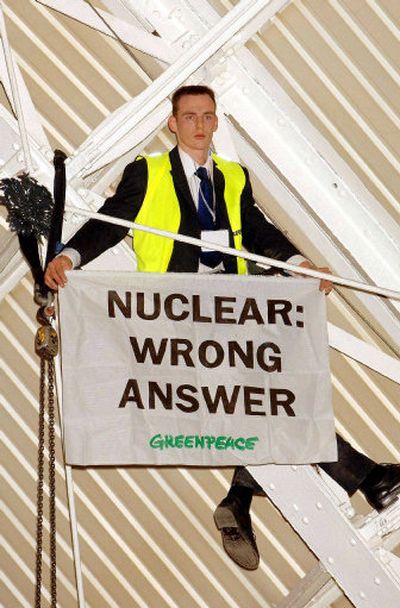Europe revisits nuclear power

LONDON – It’s the core question radiating across Europe today: How can governments fight global warming while continuing to meet their populations’ growing demands for energy?
Facing few viable answers, Europe’s leaders are showing greater willingness to buck the trend toward environmental correctness and utter that politically unspeakable N-word: “nuclear.”
The nuclear power option, widely discarded only a year or two ago as too unpopular and a surefire way to lose votes, is finding its way into political discourse as European leaders scramble to avert what they warn is a looming energy crunch.
Environmental groups already are gearing up for battle, although they admit the nuclear power lobby has made tremendous progress in advancing its cause – not only in Europe but also in the United States, which is revisiting nuclear power after a 27-year hiatus in new construction orders.
“There’s very much a sense of reopening that debate,” said Russell Marsh, director of energy policy at the Green Alliance environmental group in London. “It’s clear that other governments are changing their positions … and it’s certain that the nuclear industry has been lobbying quite hard across Europe recently.”
Polls suggest Europeans’ fears about nuclear plants’ safety have diminished since the 1986 explosion at the Soviet Union’s Chernobyl nuclear power station and the near meltdown at Pennsylvania’s Three Mile Island station in 1979. The nuclear power industry insists its safety record by far surpasses that of conventional-fuel plants, but anti-nuclear groups say other important safety issues, such as the disposal of radioactive waste, remain unresolved.
Analysts say nuclear power’s growing popularity is rooted, ironically, in the successful campaign launched by major environmental groups in recent years to draw attention to global climate change.
After pressuring world leaders to adopt policies aimed at sharply reducing emissions of greenhouse gases, such as carbon dioxide, environmental groups may have opened the door for the nuclear power lobby to argue that its technology meets those cleaner environmental standards.
“The issue back on the agenda with a vengeance is energy policy,” British Prime Minister Tony Blair said in a Nov. 29 speech. “Round the world, you can sense feverish rethinking: Energy prices have risen. Energy supply is under threat. Climate change is producing a sense of urgency. I have no doubt where policy is heading: here, in the U.S., across the emerging economies of the world.”
He added: “The future is clean energy. And nations will look to diversify out of energy dependence on one source.”
But the energy sources favored by environmental groups – wind, solar and thermal – will not come close to filling the country’s needs, Blair said. He has ordered a policy review that “will include, specifically, the issue of whether we facilitate the development of a new generation of nuclear power stations.”
Nuclear power provides 22 percent of Britain’s total energy needs, but most of the country’s 23 nuclear reactors are due for decommissioning over the next 15 years. Europe’s 204 nuclear power plants account for more than half of the world total.
Likewise in Germany, a nuclear power debate that seemed to have been put to rest long ago has rekindled. The nation has been decommissioning all of its 19 nuclear power plants with a goal of becoming nuclear-free by 2020. Now, however, the conservative government of Chancellor Angela Merkel, who took office in November, is indicating the country wants nuclear power back.
“In my view, an ideologically motivated nuclear phase-out does not reflect economic demands,” Merkel was quoted as saying this past year. She has been particularly mindful of neighboring France, which relies on nuclear power for almost 80 percent of its generating capacity and is the world’s largest exporter of electricity.
Poll results across Europe suggest that the public is amenable to a new discussion of nuclear power. In March, a European Union poll among 24,700 citizens in its 25 member states found that more than 60 percent agree that nuclear power would help diversify Europe’s energy resources, would be a viable way of reducing greenhouse-gas emissions and would help reduce Europe’s reliance on imported oil.
But most respondents agreed with the environmental lobby’s claim that the storage and transport of radioactive waste is risky and potentially dangerous to the environment and public health.
Three-quarters of respondents described themselves as not well-informed about nuclear energy. Environmentalists say ignorance makes the public vulnerable to the nuclear power industry’s arguments at a time when renewable energy sources appear to be falling out of favor.